|
|
|
Sort Order |
|
|
|
Items / Page
|
|
|
|
|
|
|
| Srl | Item |
| 1 |
ID:
132077
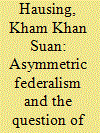

|
|
|
|
|
| Publication |
2014.
|
| Summary/Abstract |
This article intends to fill a glaring void in the existing academic literature on the issues and challenges which stem not only from crafting, but also making asymmetric federalism work in northeast India. It examines the extent and limits to which asymmetric federalism-specifically under Article 371A of India's Constitution-not only negotiates Nagas' sovereignty claims over their land and resources and caters to the demands of democratic justice, but also the extent to which it consolidates India's state-nation and democracy building in its northeastern periphery. Contending that the extant asymmetric federal arrangement in India's polity stems from a centralist federal framework, the article makes a case for a more robust asymmetric federalism, which goes beyond this framework.
|
|
|
|
|
|
|
|
|
|
|
|
|
|
|
|
| 2 |
ID:
156897
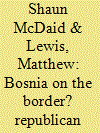

|
|
|
|
|
| Summary/Abstract |
Unionist politicians have argued that Republican political violence on the Irish border, during both the partition of Ireland and more recent Northern Ireland conflict, constituted ethnic cleansing and genocide against the Protestant/Unionist community in those areas. These views have been bolstered by an increasingly ambivalent scholarly literature that has failed to adequately question the accuracy of these claims. This article interrogates the ethnic cleansing/genocide narrative by analysing Republican violence during the 1920s and the 1970s. Drawing from a wide range of theoretical literature and archival sources, it demonstrates that Republican violence fell far short of either ethnic cleansing or genocide, (in part) as a result of the perpetrators’ self-imposed ideological constraints. It also defines a new interpretive concept for the study of violence: functional sectarianism. This concept is designed to move scholarly discussion of political and sectarian violence beyond the highly politicised and moral cul-de-sacs that have heretofore characterised the debate, and has implications for our understanding of political violence beyond Ireland.
|
|
|
|
|
|
|
|
|
|
|
|
|
|
|
|
| 3 |
ID:
071636


|
|
|
| 4 |
ID:
152919
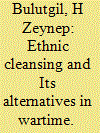

|
|
|
|
|
| Summary/Abstract |
According to the extant literature, state leaders pursue mass ethnic violence against minority groups in wartime if they believe that those groups are collaborating with an enemy. Treating the wartime leadership of a combatant state as a coherent unit, however, is misleading. Even in war, leaders differ in the degree to which they prioritize goals such as maintaining or expanding the territory of the state, and on whether they believe that minority collaboration with the enemy influences their ability to achieve those goals. Also, how leaders react to wartime threats from minority groups depends largely on the role that political organizations based on non-ethnic cleavages play in society. Depending on those cleavages, wartime minority collaboration may result in limited deportations and killings, ethnic cleansing, or minimal violence. A comparison of the policies of three multinational empires toward ethnic minority collaborators during World War I—the Austro-Hungarian Empire and Italians, the Ottoman Empire and Armenians, and the Russian Empire and Muslims in the South Caucasus—illustrates this finding.
|
|
|
|
|
|
|
|
|
|
|
|
|
|
|
|
| 5 |
ID:
163433
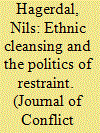

|
|
|
|
|
| Summary/Abstract |
What happens when an armed group has military incentives to engage in ethnic cleansing, but political incentives to abstain? I argue that militants can solve this dilemma by collecting intelligence that allows them to discriminate between neutral and militant non-coethnics and target only the latter. Armed groups are better able to do so in intermixed areas, where loyal coethnics provide intelligence, and thus more likely to perpetrate selective violence in such locations. Homogenous, non-coethnic enclaves are more susceptible to ethnic cleansing as armed groups often have little choice but to use ethnicity as proxy for political loyalties. I elaborate and test this argument using an original data set and extensive interviews on a critical case in the literature on ethnic cleansing: the Lebanese civil war of 1975 to 1990.
|
|
|
|
|
|
|
|
|
|
|
|
|
|
|
|
| 6 |
ID:
078776
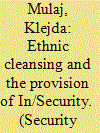

|
|
|
|
|
| Publication |
2007.
|
| Summary/Abstract |
The phenomenon of ethnic cleansing has either been considered by analysts from the point of view of history, or (ethnic) nationalism, or interpreted as the dark side of democracy. Underemphasized in the literature has been the link between the expulsion of targeted communities and the policy and practice of security. Yet, at various times, ethnic cleansing has been used as a security-creation mechanism in the process of nation-state building. Prioritization of the state in security policy and practice has provided justification for drastic measures against targeted peoples. This article seeks to offer a critique of the official rationale for the expulsion of targeted communities in terms of security. It contends that ethnic cleansing is flawed as a means of securing national security. Indeed, not only has ethnic cleansing resulted in humanitarian catastrophe, but the attainment of its stated objective - namely, the provision of security - can be unfeasible. Although state security remains an important value, its acquisition may no longer be justified independently of the means employed in its pursuit.
|
|
|
|
|
|
|
|
|
|
|
|
|
|
|
|
| 7 |
ID:
128313
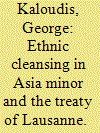

|
|
|
|
|
| Publication |
2014.
|
| Summary/Abstract |
George Kaloudis, discusses events in Greece and Turkey that led to a Christian Holy War against infidels in 1921, and how the Treaty of Lausanne, brokered by European states, reinforced the ethnic genocide that followed in its wake. The Treaty of Lausanne was rooted in the prevailing ideal of the "nation-state," in which each state would consist of a homogeneous ethnic nationality. This concept is, at its core, a concept of structural violence, because there is no such thing as a modern state in which all residents hold identical ethnic and cultural views. Yet, this concept still inspires elites to seek for the elusive ideal in which all citizens will identify with and agree with the policies of the state because they reinforce a particular national ethnic or religious culture.
|
|
|
|
|
|
|
|
|
|
|
|
|
|
|
|
| 8 |
ID:
140369
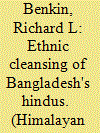

|
|
|
| 9 |
ID:
095098


|
|
|
| 10 |
ID:
087483


|
|
|
|
|
| Publication |
2009.
|
| Summary/Abstract |
This article explores to what extent the security dilemma through geographically induced first-strike advantages is a contributing cause of ethnic warfare. If there are possibly decisive advantages to be gained from striking the first blow, both temptation and fear may shortcut efforts to resolve a conflict in less costly ways, and trigger massive violence. Theoretical work and case studies suggest that in ethnic conflicts intermingled settlement patterns give rise to such first-strike advantages. I test whether ethnic groups in conflict are more likely to become involved in ethnic warfare if their main region of settlement is ethnically diverse. I also include controls intended to capture other aspects of the security dilemma. In robustness tests, I add indicators of group concentration and local majority status that have been found to increase the risk of ethnic violence in previous quantitative studies. I find a strong, statistically significant association between regional ethnic diversity and ethnic warfare.
|
|
|
|
|
|
|
|
|
|
|
|
|
|
|
|
| 11 |
ID:
146414
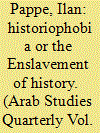

|
|
|
|
|
| Summary/Abstract |
This article examines closely the role of the 1948 Palestinian catastrophe in the contemporary peace process. It argues that peace mediation in the conflict regarded history in general an obstacle for progress and the Palestinian victimization in 1948 as a marginal and irrelevant issue. This peace process, which ignored the ethnic cleansing of Palestine in 1948 and its impact on the contemporary reality, failed dismally. The article argues that only a courageous encounter with the crime committed in 1948 and an authentic search for rectifying it through restitutive justice, and not retribution, can open up a genuine process of reconciliation in Palestine.
|
|
|
|
|
|
|
|
|
|
|
|
|
|
|
|
| 12 |
ID:
187559
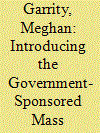

|
|
|
|
|
| Summary/Abstract |
This article introduces the Government-Sponsored Mass Expulsion (GSME) dataset documenting cross-border mass expulsion episodes around the world from 1900 to 2020. This new dataset focuses on mass expulsion policies in which governments systematically remove ethnic, racial, religious or national groups, en masse. The GSME dataset disaggregates mass expulsion from other exclusionary politics concepts to isolate policies of intentional group-based population removal. This allows for a systematic examination of governmental expulsion policies, distinct from policies aimed at annihilation (genocide), control (massacre) or cultural elimination (coercive assimilation). The GSME dataset documents 139 expulsion episodes since 1900, affecting over 30 million citizens and non-citizens across all world regions. The data are drawn from archival research conducted at the United Nations High Commissioner for Refugees and the International Committee of the Red Cross, as well as secondary sources and extant datasets. This article presents an empirical overview of the data including information on the expelling country, onset, duration, region, scale, category of persons expelled, and frequency. Although mass expulsion is a rare event, it is a reoccurring rare event. Its consistent use – with over two million people expelled in the last five years alone – demands additional empirical and theoretical investigation. The GSME dataset contributes to the study of exclusionary politics as a dependent variable, but it also offers promise as an explanatory variable for those studying phenomena affected by mass expulsion.
|
|
|
|
|
|
|
|
|
|
|
|
|
|
|
|
| 13 |
ID:
112532
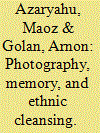

|
|
|
|
|
| Publication |
2012.
|
| Summary/Abstract |
Much of the recent academic literature on the 1948 war portray it a one-sided-and thus simplistic-ethnic cleansing of the Arab population of Palestine. Referred to as the Naqba paradigm, it features the Jews/Zionists as villainous perpetrators and the Palestinian Arabs as feeble victims. Accordingly, the story of "the 1948 Ethnic Cleansing of Palestine" excludes expulsion and massacres of Jews, the destruction of Jewish communities, and the erasure of the Jewish signifiers in the local landscape from the story. As made explicit in John Phillips' photo-reportage featuring the destruction of the Jewish Quarter of the Old City of Jerusalem, the ethnic cleansing of Palestine also involved the expulsion of Jews and the destruction of their communities-whenever and wherever military power relations were in favor of Arab forces.
|
|
|
|
|
|
|
|
|
|
|
|
|
|
|
|
| 14 |
ID:
151401
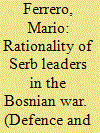

|
|
|
|
|
| Summary/Abstract |
This paper asks whether Bosnian Serb leaders’ choice to carry out a secession war in 1992–1995 was rational from the point of view of their stated goal of ethnic cleansing. We construct two indexes, one of ethnic purity and another of ethnic Serb concentration, and apply them to a counterfactual estimate of the outcome of ‘peaceful’ ethnic cleansing – what could have been achieved by population exchange based on pre-war territorial Serb power without war – in comparison to the actual outcome of the war. We find that the gross benefits of the chosen strategy of secession and war far exceed anything that could be achieved by the peaceful alternative. A conjectural assessment of perceived costs suggests that also net benefits were maximized by the war strategy. The implication for international deterrence policy is that credible judicial prosecution and punishment is the best way to alter the prospective perpetrators’ calculus.
|
|
|
|
|
|
|
|
|
|
|
|
|
|
|
|
| 15 |
ID:
097175


|
|
|
|
|
| Publication |
2010.
|
| Summary/Abstract |
This article revisits the debate, hosted by this journal in the 1990s, on whether the Provisional IRA campaign was sectarian. In the light of current debates about how Northern Ireland deals with its past, it challenges the analysis that emphasises the non-sectarian ideology of republicanism and ignores the effects of IRA violence. It uses research on the IRA campaign in Fermanagh and south Tyrone to argue that the campaign was unavoidably sectarian but rejects current attempts to label it a form of "ethnic cleansing."
|
|
|
|
|
|
|
|
|
|
|
|
|
|
|
|
| 16 |
ID:
151088
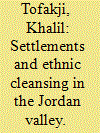

|
|
|
|
|
| Summary/Abstract |
In recent years, the Israeli government has intensified its settlement activities in the Jordan Valley, in a policy that essentially amounts to ethnic cleansing.
|
|
|
|
|
|
|
|
|
|
|
|
|
|
|
|
| 17 |
ID:
141227
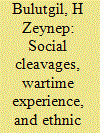

|
|
|
|
|
| Summary/Abstract |
What explains ethnic cleansing? Recent research has used systematic evidence to explore the causes of civilian victimization and mass killings. Yet, comparable studies that focus on ethnic cleansing are still rare. This article conceptualizes ethnic cleansing as a group-level phenomenon that is distinct from civilian victimization or mass killings and studies its causes by using systematic evidence from Europe 1900–2000. The article makes two theoretical moves. First, it highlights the salience of non-ethnic cleavages such as social class as a background condition that has the ability to hinder ethnic cleansing. Second, it distinguishes between two causal mechanisms, one that considers wars as ‘strategic environments’ and the other as ‘transformative experiences’, that relate to the proximate causes of ethnic cleansing. Using original data from 20th-century Europe, the empirical analysis offers two main findings. First, it shows that salient social cleavages, measured through levels of land inequality, political competition, and support for left-wing parties, substantially decrease the risk of ethnic cleansing. Second, the analysis suggests that the arguments that underscore psychological mechanisms related to wartime experiences provide a better explanation for ethnic cleansing than the arguments that emphasize the role of strategic wartime aims. This finding is further supported by a brief discussion of key cases in which both causal mechanisms predict ethnic cleansing. The results highlight the importance of treating ethnic cleansing as a conceptually separate phenomenon and offer implications for the debate on democracy and mass ethnic violence.
|
|
|
|
|
|
|
|
|
|
|
|
|
|
|
|
| 18 |
ID:
101333
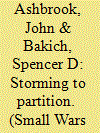

|
|
|
|
|
| Publication |
2010.
|
| Summary/Abstract |
To many scholars and policymakers, 'partition' offers the most efficacious means of resolving ethnic-civil wars. Others reject partition as a solution, citing flaws (both logical and empirical) and harmful international implications should such an approach become commonplace. What has been missing from this debate is an understanding of how the process of partition unfolds. In this article we examine such a process, the case of the Krajina in the war in Yugoslavia, 1994-1995. The US aligned itself with Croatia against Serbs rebelling in the Krajina region of Croatia. The culmination of this alignment occurred in August 1995 when Croatian forces initiated 'Operation Storm' (Oluja) against Croatian Serb insurgents. Croatian forces effectively cleansed the Krajina of its Serbian population. Eager to initiate a diplomatic peace process, Washington welcomed the Croatian operation, and largely because of Operation Storm, negotiations at Dayton became possible.
|
|
|
|
|
|
|
|
|
|
|
|
|
|
|
|
| 19 |
ID:
158875
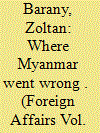

|
|
|
|
|
| Summary/Abstract |
Late last year, when news broke that Myanmar’s military had been systematically killing members of the country’s Muslim Rohingya minority [1], much of the world was shocked. In recent years, Myanmar (also known as Burma) had been mostly a good news story. After decades of brutal dominance by the military, the country had seen the main opposition party, the National League for Democracy, score an all-too-rare democratic triumph [2], winning the 2015 national elections in a landslide. The NLD’s leader, Aung San Suu Kyi, an internationally celebrated dissident who had received the 1991 Nobel Peace Prize for her efforts to democratize Myanmar, became Myanmar’s de facto head of state. Many analysts and officials concluded that the county was finally on the path to democratic rule. Support poured in from Western democracies, including the United States. Myanmar had long been isolated, relying almost exclusively on China, which was content to turn a blind eye to human rights abuses. Now, many hoped, Suu Kyi [3] would lead the country into the Western-backed international order.
|
|
|
|
|
|
|
|
|
|
|
|
|
|
|
|
| 20 |
ID:
125313
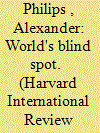

|
|
|
|
|
| Publication |
2013.
|
| Summary/Abstract |
Children starve. Young girls sell their bodies to eat. There is no clean drinking water. There are no doctors. Refugees are not allowed to leave the camps. As the rainy season approaches, waterborne diseases will spread like wildfire. This is the plight of the over 200,000 Rohingya who survive in makeshift refugee camps along the Myanmar's border with Bangladesh. Although their situation is dire, they are better off than the Rohingya being slaughtered back in Myanmar. According to the United Nations, the Rohingya are the world's most ignored and persecuted minority. They have faced decades of neglect and dehumanization while the world stands by; it is time for the response of the international community to change. The situation in Myanmar has reached a tipping point and the country is a tinderbox, ready to ignite into violence. The inaction of the international community has allowed the persecution of the Rohingya Muslim minority to escalate into state-sponsored ethnic cleansing and a spreading humanitarian crisis in Myanmar's western Rakhine state
|
|
|
|
|
|
|
|
|
|
|
|
|
|
|
|
|
|
|
|
|